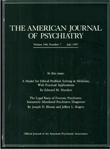Use of Health Services by Hospitalized Medically Ill Depressed Elderly Patients
Abstract
OBJECTIVE: The authors examined whether depression is associated with greater use of health services by elderly medical patients before and during hospitalization. METHOD: Depression and recent use of health services were assessed in 542 patients aged 60 or over who were consecutively admitted to university medical services. Depression was measured by using the Center for Epidemiologic Studies Depression Scale, the Hamilton Depression Rating Scale, and the depressive disorders section of the National Institute of Mental Health Diagnostic Interview Schedule, which was administered by a psychiatrist. RESULTS: After age, sex, race, education, and severity of medical illness were controlled for, Hamilton depression score significantly predicted hospital days in the past year, hospital days and total inpatient days (hospital plus nursing home) in the past 3 months, and number of outpatient medical visits in the past 3 months. Depressed patients had more hospital days in the past year and had more hospital days, total inpatient days, and outpatient medical visits in the past 3 months than did nondepressed patients. Associations between depression and length of index hospital stay, home health visits, nursing home days, and number of prescription medications disappeared when severity of medical illness was controlled. Mental health visits were no more common among depressed than nondepressed patients. CONCLUSIONS: Depressed elderly medical inpatients used more hospital and outpatient medical services than nondepressed patients, but they did not receive more mental health services. Efforts by primary care physicians and third-party payers to identify and treat depression in this population are needed. (Am J Psychiatry 1998; 155:871–877)



